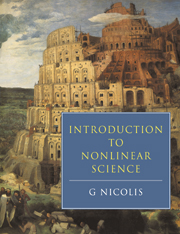Book contents
- Frontmatter
- Contents
- Preface
- 1 Nonlinear behavior in the physical sciences and biology: some typical examples.
- 2 Quantitative formulation
- 3 Dynamical systems with a finite number of degrees of freedom
- 4 Linear stability analysis of fixed points
- 5 Nonlinear behavior around fixed points: bifurcation analysis
- 6 Spatially distributed systems, broken symmetries, pattern formation
- 7 Chaotic dynamics
- Appendices
- References
- Index
1 - Nonlinear behavior in the physical sciences and biology: some typical examples.
Published online by Cambridge University Press: 05 June 2012
- Frontmatter
- Contents
- Preface
- 1 Nonlinear behavior in the physical sciences and biology: some typical examples.
- 2 Quantitative formulation
- 3 Dynamical systems with a finite number of degrees of freedom
- 4 Linear stability analysis of fixed points
- 5 Nonlinear behavior around fixed points: bifurcation analysis
- 6 Spatially distributed systems, broken symmetries, pattern formation
- 7 Chaotic dynamics
- Appendices
- References
- Index
Summary
What is nonlinearity?
Introductory science textbooks – and much of our educational system, for that matter – are built on the idea that a natural system subjected to well-defined external conditions will follow a unique course and that a slight change in these conditions will likewise induce a slight change in the system's response. Owing undoubtedly to its cultural attractiveness, this idea, along with its corollaries of reproducibility and unlimited predictability and hence of ultimate simplicity, has long dominated our thinking and has gradually led to the image of a linear world: a world in which the observed effects are linked to the underlying causes by a set of laws reducing for all practical purposes to a simple proportionality.
Appealing and reassuring as it may sound, this perennial idea is now being challenged and shown to provide, at best, only a partial view of the natural world. In many instances – and as a matter of fact in most of those interfering with our everyday experience – we witness radical, qualitative deviations from the regime of proportionality. This book has to do with nonlinearity, that is to say, the phenomena that can take place under these conditions.
A striking difference between linear and nonlinear laws is whether the property of superposition holds or breaks down.
Information
- Type
- Chapter
- Information
- Introduction to Nonlinear Science , pp. 1 - 24Publisher: Cambridge University PressPrint publication year: 1995
